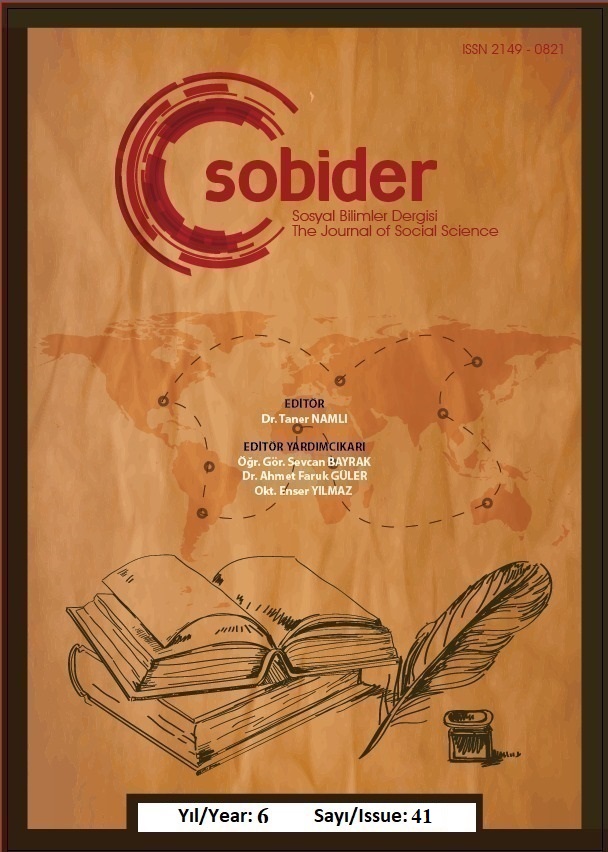ÜNİVERSİTE ÖĞRENCİLERİNİN ÇEVRE DUYARLILIKLARININ VE ÇEVRE VERGİLERİNE YÖNELİK DÜŞÜNCELERİNİN ARAŞTIRILMASI: ORDU ÜNİVERSİTESİ ÖRNEĞİ
Author :
Abstract
İnsanların çeşitli faaliyetleriyle oluşturdukları çevresel tahribatla ortaya çıkan küresel ısınmanın etkileri günden güne daha somut bir şekilde hissedilmektedir. Ekosistemin dengesini bozarak dünyanın geleceğini tehdit eden küresel ısınma, siyasi ve ekonomik bütün çıkarların bir kenara bırakılarak tüm ülkelerce çeşitli önlemler alınması gereken bir olgudur. Bu anlamda günümüzde birçok ülke çevre kirliliğinin önlenmesi için çeşitli vergi ve mali reformlar uygulamaktadır. Gelecek nesle ışık tutacak olan ve belirli akademik eğitimi alan üniversite öğrencilerinin bu konuda bilinçlendirilmesinin etkili olacağı varsayımıyla, çalışmanın amacı üniversite öğrencilerinin çevre kirliliği konusunda farkındalığını artırarak öğrencilerin çevre vergilerine yönelik uygulamalara nasıl yaklaştıklarını araştırmaktır. Anket uygulamasının deney grubunu 2017-2018 eğitim öğretim bahar yarıyılında, Ordu Üniversitesi Sosyal Bilimler Meslek Yüksekokulu’nun 4 farklı bölümünde öğrenim görmekte olan 356 öğrenci oluşturmaktadır. Araştırmanın sonuçlarına göre öğrencilerin geneli çevre kirliliğinden ve halkın bilinçsizliğinden rahatsızlık duymaktadır. Araştırmaya katılan öğrenciler çevresel vergilerin sadece çevre ile ilgili sorunların çözümünde kullanılmasını istemektedir. Ayrıca öğrenciler çevre vergilerinden elde edilen gelirin nasıl kullanıldığının şeffaf bir şekilde kamuyla paylaşılmasına büyük önem vermektedir.
Keywords
Abstract
The effects of global warming caused by environmental damage caused by people's various activities are felt more tangibly from day to day. Global warming, which threatens the future of the world by disrupting the ecosystem balance, is a phenomenon in which all the political and economic interests must be taken into consideration by all countries and all measures must be taken. In this sense, many countries today apply various tax and financial reforms to prevent environmental pollution. The aim of the study is to investigate how students approach environmental taxation practices by increasing their awareness of environmental pollution, with the assumption that university students who will shed light on future generations and have a certain academic background will be more aware of this issue. The experimental group of the survey consists of 356 students who are studying in 4 different sections of Ordu University Social Sciences Vocational School in spring semester of 2017-2018 education and training. According to the results of the survey, most of the students are disturbed by the environmental pollution and the unconsciousness of the people. Students participating in the study want environmental taxes to be used only in solving environmental problems. In addition, students attach great importance to sharing the use of income from environmental taxes in a transparent manner.
Keywords
- Agrawal, A. W., Jennifer D., Hilary N., “Green transportation taxes and fees: A survey of public preferences in California”, Transportation Research Part D, 2010, 189-196.
- Ağacan İ Saruç N. T., “Maliye Lisans Düzeyinde Alınan Eğitimin Çevre Vergisi Bilincine Etkisi: Dumlupınar Üniversitesi Örneğİ”, Dumlupınar Üniversitesi Sosyal Bilimler Dergisi 44, 2015, Sayı ss.1-8.
- Akdoğan A., Kamu Maliyesi, 17. Baskı, Gazi Kitabevi ,Ankara, 2016.
- Arıkan, R., Araştırma Teknikleri ve Rapor Hazırlama. Ankara: Asil Yayın. 2004.
- Baranzini A. ve Carattini S., “Effectiveness, earmarking and labeling: testing the acceptability of carbon taxes with survey data”, Environmental Economics Policy Studies 1(19), 2017, 197-227.
- Çabuk B. Karacaoğlu C.., “Üniversite Öğrencilerinin Çevre Duyarlılıklarının İncelenmesi”, Ankara Üniversitesi Eğitim bilimleri Fakültesi Dergisi, 2003, 36(1-2).
- Eurostat, Evrionmental Taxes A Statical Guide, Methods and Nomenclatures, ISBN 92-894- 1358-1, 2001 Edition.
- Eurostat, Evrionmental Taxes A Statical Guide, ISSN 1681-4789, 2013 Edition.
- Fairbrother M., “Trust and Public Support for Environmental Protection in Diverse National Contexts”, Sociological Science,June 8, 2016, ss.359-382.
- Kılıç S.,,”Ki-kare Testi”, Journal of Mood Disorders (JMOOD), 2016, 6(3), 180-182.
- Knıgge, M., Benjamin, G., “Effects of Germany’s Ecological Tax Reforms on the Environment, Employment and Technological Innovation: Summary of the Final Report of the Project: Quantifizierung der Effekte der Ökologischen Steuerreformauf Umwelt, Beschäftigung und Innovation”, Ecologıc, 2005, August.
- Kurt A. R. , Brianna R. B., “University Students and Sustainability. Part 1: Attitudes, Perceptions, and Habits”, Lowa State University Digital Repository, Volume 16, 2017.
- Reyhan, A. S., “Çevre Ekonomisinde Çevre Vergileri Uygulamaları”, Hitit Üniversitesi Sosyal Bilimler Enstitüsü Dergisi, Yıl 7, Sayı 1, 2014, ss. 110-120.
- Schöb, R., “The Double Dividend Hypothesis of Environmental Taxes: A Survey”, CESifo Working Paper, No: 946,2003, pp. 1-58.
- Sippel M., Meyer D., Scholliers N., ”What about greenhouse gas emissions from students? An analysis of lifestyle and carbon footprints at the University of Applied Science in Konstanz”, Germany. Carbon Management, 2018, 9(2), ss.201-211.
- Turan İ., Şimşek Ü., Aslan H., “Eğitim Araştırmalarında Likert Ölçeği ve Likert-Tipi Soruların Kullanımı ve Analizi”, Sakarya Üniversitesi Eğitim Fakültesi Dergisi, 2015, (30), ss. 186-203.
- Uslu Şenel G., Nacar Koçer N, Öbek E., “Üniversite Son Sınıf Öğrencilerinde Çevre Bilincinin Değerlendirilmesi”. The Journal of Academic Social Science Studies 2017, sayı:64, ss. 211-225.
